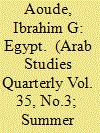| Srl | Item |
| 1 |
ID:
164746


|
|
|
|
|
| Summary/Abstract |
This article will discuss Israeli machinations to covet substantial areas of the Lebanese maritime exclusive economic zone, while knowing full well that international law has sided with Lebanon in this matter. The conflict between Israel and Lebanon will be discussed in the context of the relations among regional states and the conflict of East Mediterranean states over maritime oil and gas fields. Main questions that arise in this regard are as follows: First, is it a matter of oil and gas reserves over and above its share that Israel is seeking to capture or does the controversy have to do with regional domination or both? Second, what is the significance of the US envoys’ visits in early 2018 to Beirut, presumably to resolve the disagreement between Lebanon and Israel? Third, have those visits defused the situation between the two states involved or added fuel to the fire? Fourth, what is the significance of Israel's occupation of parts of Lebanon's territory to the issue of offshore oil and gas and how might it relate to the cement wall that Israel has been constructing partially in Lebanese territories? Fifth, what is the probability of an Israeli attack on Lebanon that could quickly transform into a regional conflict?
|
|
|
|
|
|
|
|
|
|
|
|
|
|
|
|
| 2 |
ID:
124602


|
|
|
|
|
| Publication |
2013.
|
| Summary/Abstract |
The upheaval that has swept the Arab world, beginning in December 2010, reached Egypt on January 25, 2011. The article argues that capitalist globalization and ultimately the 2008 global financial crisis were main causes of the uprising. The Mubarak regime's privatization schemes exacerbated poverty and widened the already huge gap between rich and poor. Mubarak employed repression to ensure that no effective political opposition would materialize to challenge his authoritarian rule and crony capitalism. Strikes and demonstrations beginning in 2006 and the lead up to the uprising demonstrated that the fight for democracy and economic justice had been intertwined. The ouster of Mubarak has not improved the economic situation for the majority of the population and authoritarian rule remained under the military and since the election of the Islamist President Morsi. Popular resistance continues against the Islamists in power to bring about a secular regime that would establish democracy and economic justice.
|
|
|
|
|
|
|
|
|
|
|
|
|
|
|
|